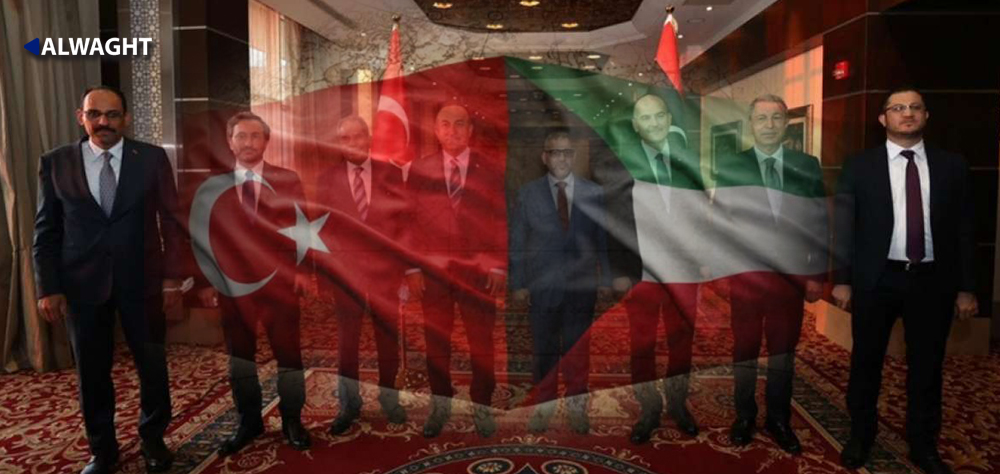Alwaght- Two days ahead of the NATO meeting in Brussels, a high-ranking Turkish delegation, including Defense Minister Hulusi, Foreign Minister Mevlut Cavusoglu, intelligence chief Hakan Fidan, and presidential chief of staff and spokesman, arrived in Libya in a surprise visit. Visit to Libya of the Turkish delegation certainly bears signs to a new Ankara foreign policy era regionally and internationally.
Preventing anti-Turkish consensus in NATO
The high-level Turkish delegation is being sent to Libya at a time when many media outlets and international observers are expecting a meeting between US President Joe Biden and his Turkish counterpart Recep Tayyip Erdogan at the forthcoming North Atlantic Treaty Organization summit in Brussels. The dominant view of observers is that Biden is likely to make serious criticism of Erdogan and Ankara's policies at the NATO meeting. Another sensitive aspect of the meeting between Erdogan and Biden is that Biden in 2019 and during an interview with New York Times described Erdogan as an authoritarian leader and called for support to the opposition to oust the ruling Justice and Development Party (AKP).
So, it seems that at this stage, Turkey, by adopting an active strategy and taking multi-level actions, intends to minimize the possibility of a challenging meeting between the US and Turkish presidents in Brussels. Also, before trip to Libya, Akar had met his Italian and British counterparts in Sicily, Italy. Also in a more important stance, he talked about his country's readiness to remove the NATO allies' concerns about the Russian-supplied S-400 air defense systems which have been a source of frayed relations between Ankara and Western military bloc over the past two years.
“Reasonable and logical solutions are always possible,” Akar said Friday after a phone call the day before with his American counterpart, Lloyd Austin.
These diplomatic statements and stances, and at the same time the visit of the Turkish delegation to Libya, can be read at two levels. First, Ankara seeks to ease the tense atmosphere between Erdogan and other NATO leaders in Brussels by showing signs of flexibility to the Western and NATO demands. Second, Turkey intends to make it clear to the NATO members that in pursuit of its regional interests, Turkey reserves a margin of independence for itself.
Turkey seeking to consolidate power in Libya
The Tripoli visit is also linked to Turkey's major Libya strategy. Actually, by stepping deep into the Libyan crisis, the Turkish government intends to take advantage of this North African country in its long-term neo-Ottomanist strategy. Following General Haftar-led offensive to seize the capital in 2019, Turkey officially and openly sent military equipment including combat drones and proxy fighters from Syrian fronts to assist the Government of National Accord in Tripoli led by Prime Minister Fayez al-Sarraj, and has since been present powerfully in all Libyan developments.
But the reality is that Erdogan and Turkish politicians are seeking to seize Libya's economic, energy, and trade opportunities rather than caring about political and security issues in the war-ravaged country. In its overall policy approach, Turkey seeks to have the lion's share from the Libyan energy, economy, and reconstruction contracts with reliance on its direct military presence there. In the past two years, Ankara government paved the way for presence of Turkish contractors in a wide range of Libyan projects.
Most importantly, Erdogan last year claimed, relying on the energy deal al-Sarraj government signed with the Turkish government, only Ankara had the right to explore and produce gas in the Mediterranean, drawing wide-range opposition from the coastal states. In December 2019, the al-Sarraj government signed gas exploration agreement with Turkey, along with a security and defense cooperation pact. According to the agreement with Libya, said Erdogan, Turkey can drill in Libyan waters for oil and gas, and this is not in conflict with the international laws. The Turkish government asserts that other international actors can no longer conduct drilling and exploration operations in the region. Specifically, the Greek part of Cyprus, Egypt, Israel, and Greece are not allowed to build a gas pipeline in the region without obtaining permission from Turkey.
Additionally, a $16 billion economic agreement was signed last year between the Turkish and Libyan governments according to which Turkish companies were given the contract to complete large construction projects halted due to the civil war. This is only part of their economic partnership to complete 184 construction projects. In this contract, Erdogan, as pieces of evidence show, has his eyes on $67 billion in the blocked Libyan money and assets.
Lastyear, the Turkish leader highlighted his country's resolve to seize oil-rich regions in Libya in addition to the gas fields. This pushes many experts to the conviction that Erdogan's Turkey holds ambitious and clear-cut programs to dominate Libyan oilfields. Generally, the high-level Turkish visit to Libya, amid the current international circumstance, bears obvious signs to Ankara’s serious intent to pursue its specific economic, military, and security strategy to build dominance over Libya and strengthen its position there.



























